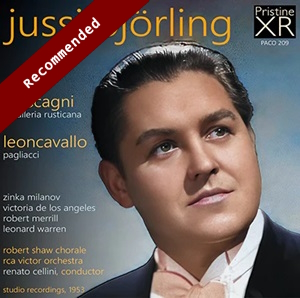
Pietro Mascagni (1863-1945)
Cavalleria rusticana (1890)
Ruggero Leoncavallo (1857-1919)
I Pagliacci (1892)
Jussi Björling, tenor (Turiddu, Canio*)
Zinka Milanov, soprano (Santuzza)
Victoria de los Ángeles, soprano (Nedda*)
Robert Merrill, baritone (Alfio, Silvio*)
Leonard Warren, baritone (Tonio*)
RCA Victor Orchestra/Renato Cellini
rec. 1953, New York City
XR remastering by Andrew Rose, 2024
Pristine Audio PACO209 [2 CDs: 140]
These famous recordings may be best known for capturing Jussi Björling, Zinka Milanov, Victoria de los Ángeles and Robert Warren in their vocal prime. RCA made the originals in January-March 1953. To my ears, accustomed to modern hi-fi sound, the limitations of magnetic tape technology of the era can militate against full enjoyment. My close friend gets great pleasure from listening to singers both well-known and obscure in elderly recordings which make this cast seem youthful, but for me good sound is pretty much a necessity.
I have listened with some amazement to Pristine Audio’s remastering of Rachmaninov performing his own concertos (review), so I approached this set with anticipation of good things. I first read up on Andrew Rose’s XR Remastering process – see here for the details if you are interested in this form of audio restoration technology. I remember how in the early 1970s Decca, in an attempt to make their older mono recordings more appealing, issued them as “electronic stereo”; those efforts made me avoid the Decca Eclipse label. Things have come a long way.
The first indication of the wizardry involved in producing these discs is the orchestral introduction to each opera. I was able to compare the sound to that on RCA’s original CDs (I Pagliacci is now on EMI). The difference is astonishing. A narrow and dry restricted soundstage expands into a much warmer, fuller acoustic which, like a stereo recording, has width and some depth. I literally sat up, especially in I Pagliacci. There does not seem to be a stereo effect on the positioning of the voices, but they are present in superior soundstage.
Björling’s immaculate tenor leaps out of the speakers, rich and firm. He was only 42 then. How people can say that he was a cold singer, I do not know. His singing with Milanov in their angry argument outside the church in Act 1 of Cavalleria rusticana is a knockout, and so is hers. In I Pagliacci, de los Ángeles beautifully characterises Nedda, and is tragically moving, guilty though Nedda is. As for Vesti la giubba, well, has anguish whilst applying laughing make-up ever been done better? Björling does not produce an Italianate sobbing, and at the end of the opera he does not indulge in raving fury. It is icy fury, supremely effective.
The area where the sound may not have completely worked is when I presume the original master tapes reached saturation, when there are considerable histrionics between two or more singers. I noticed it first during Turiddu’s angry, callous confrontation with Santuzza. As their voices rise in duet, I can detect almost a white noise which compresses their singing. There may be more descriptive words, but these will have to do. The effect is not particularly noticeable, and pales into insignificance in comparison with what Andrew Rose has achieved in these remarkable restorations.
Jim Westhead
Availability: Pristine ClassicalOther Cast
Margaret Roggero, mezzo-soprano (Mamma Lucia) Carol Smith, contralto (Lola) Paul Franke, tenor (Beppe*)
The Robert Shaw Chorale, The Columbus Boychoir
* performances in I Pagliacci


















